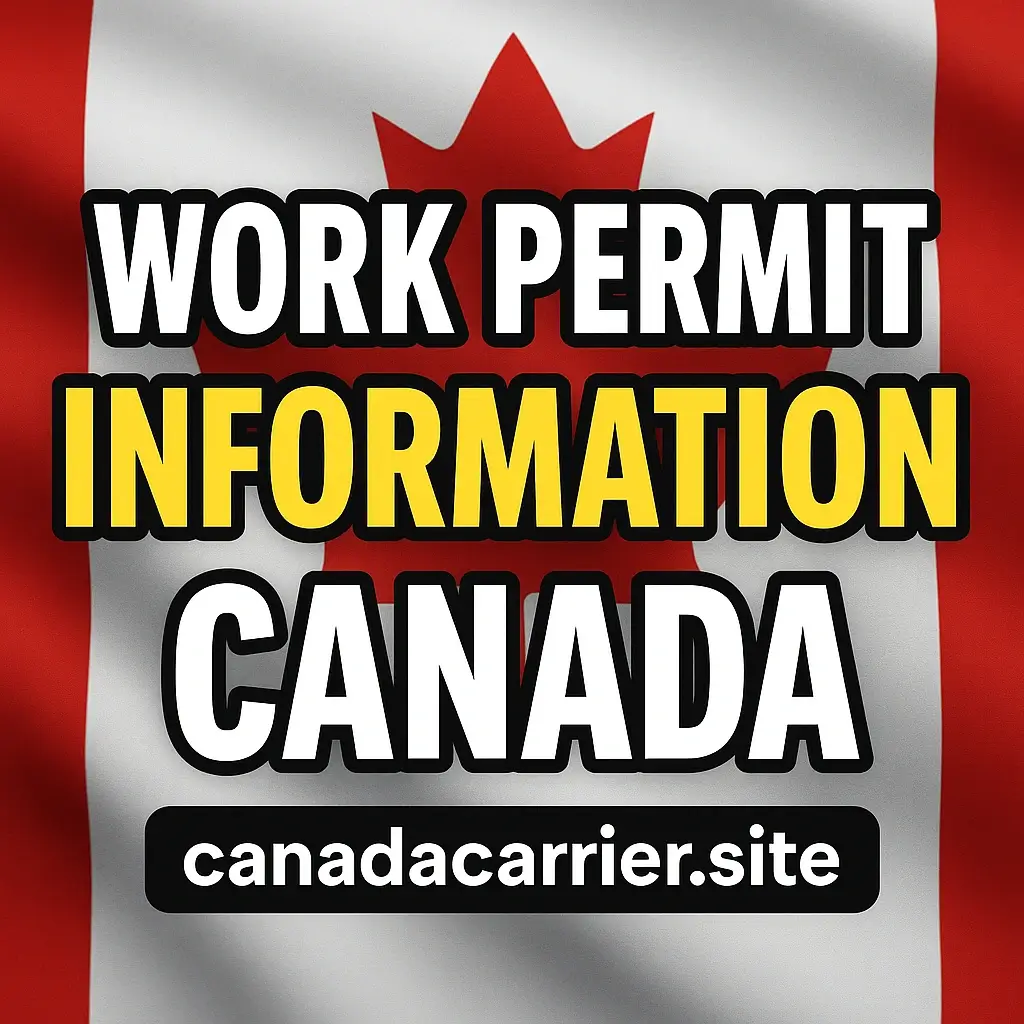
Work Permit Information – Canada (2026 Complete Guide)
Canada has become one of the most attractive destinations for foreign workers who want better job opportunities, higher salaries, and a safe living environment. Each year, thousands of skilled and unskilled workers enter Canada with the help of work permits and visa sponsorships from Canadian employers.
Our website, Canada Carrier, is designed to help job seekers worldwide find real, verified job opportunities in Canada with employers who are willing to sponsor work visas. We guide you through the step-by-step process, provide application tips, and connect you with trusted recruiters and companies.
Whether you want to work as a driver, food packer, electrician, security guard, plumber, or general labourer, this guide will explain everything about the Canadian work permit process so you can start your journey with confidence.
1. Understanding the Canadian Work Permit
A Canadian work permit is an official authorisation issued by Immigration, Refugees and Citizenship Canada (IRCC) that allows a foreign national to legally work in Canada for a specific period.
In most cases, it is directly connected to a job offer from a Canadian employer, and the employer may need to apply for a Labour Market Impact Assessment (LMIA) before hiring you.
Without a valid work permit, you cannot legally work in Canada. However, with the right job and sponsorship, you can not only work but also pave the way towards Permanent Residency (PR).
2. Types of Work Permits in Canada
Canada offers two main types of work permits:
a) Employer-Specific Work Permit
- Tied to a single employer and job position.
- State your employer’s name, job location, and how long you can work.
- Often requires the employer to obtain an LMIA from Employment and Social Development Canada (ESDC).
Example: If you get hired as a truck driver by a transport company in Ontario, your work permit will list that company’s name, your role, and your work location.
b) Open Work Permit
- Allows you to work for almost any employer in Canada (with some exceptions).
- Does not require an LMIA or a confirmed job offer.
- Usually available to specific categories such as spouses of skilled workers, international students, or applicants under certain immigration programs.
Example: If your spouse is studying in Canada, you may get an open work permit to work for any employer in the country.
3. Why Visa Sponsorship is Important
Many foreign workers cannot apply for a work permit without first securing a job offer from a Canadian employer. Visa sponsorship means:
- The employer is willing to hire you from abroad.
- They will provide an official job offer letter.
- They will help with work permit documentation, and in many cases, cover your visa and ticket costs.
At Canada Carrier, we focus on listing jobs that come with genuine visa sponsorship so you can apply directly to trusted employers without wasting time on fake offers.
4. Who is Eligible for a Canadian Work Permit?
Eligibility depends on your job type, nationality, and employer. Generally, you must:
- Be at least 18 years old (some jobs accept workers aged 50 or under).
- Have a valid job offer from a Canadian employer (for employer-specific permits).
- Possess the skills or experience required for the job.
- Have no serious criminal record (must provide a police clearance certificate).
- Pass a medical examination if required.
- Hold a valid passport with at least 6 months’ validity.
5. Required Documents for a Work Permit
Before applying, prepare these documents:
- Valid passport (with blank pages for visa stamping).
- Job offer letter from a Canadian employer.
- LMIA approval (if applicable).
- Proof of qualifications (degrees, diplomas, trade certificates).
- Work experience letters from previous employers.
- Police clearance certificate.
- Medical examination results.
- Passport-size photographs.
- Proof of funds (if required by IRCC).
6. Step-by-Step Canadian Work Permit Process
Step 1 – Find a Sponsoring Employer
Visit Canada Carrier to explore job listings with verified visa sponsorship. Choose jobs that match your skills and experience.
Step 2 – Employer Applies for LMIA
Your employer must apply to ESDC for Labour Market Impact Assessment approval (unless your job is LMIA-exempt).
Step 3 – Receive Job Offer Letter
Once the LMIA is approved, you’ll receive an official job offer letter from your employer.
Step 4 – Apply for a Work Permit
Submit your application online via the IRCC portal along with all required documents and fees.
Step 5 – Biometrics & Medical Exam
Provide fingerprints and photographs at your nearest visa application centre. Undergo a medical examination if required.
Step 6 – Wait for Processing
Work permit processing can take 2 to 6 months, depending on your country and job type.
Step 7 – Travel to Canada
Once your work permit is approved, book your ticket and start your job in Canada.
7. Processing Time & Fees
- Processing Time: 2–6 months (may be faster for certain programs).
- Work Permit Fee: CAD $155 per person.
- Open Work Permit Fee: Additional CAD $100.
- Biometrics Fee: CAD $85 per person.
8. Benefits of a Canadian Work Permit
- Legal work authorization in Canada.
- Opportunity to apply for Permanent Residency (PR).
- Competitive salaries (often higher than in many countries).
- Free healthcare in most provinces for eligible workers.
- Visa sponsorship benefits – free visa, ticket, accommodation, and meals in some cases.
- Multicultural and safe working environment.
9. How Canada Carrier Helps You
At Canada Carrier, we:
- Post verified job listings with Canadian employers.
- Share opportunities that include visa sponsorship.
- Provide step-by-step guides on work permits and visa processes.
- Offer free information — no hidden charges for viewing job listings.
- Connect you with employers in skilled & unskilled sectors.
Final Advice
Canada offers incredible opportunities for workers from around the world. But the process can be complex — and scams are common. Always:
- Apply through trusted sources like Canada Carrier or the official IRCC website.
- Avoid paying large sums to agents who promise guaranteed jobs.
- Double-check employer credentials before sending personal information.
With the right job offer and a clear understanding of the process, you can start your Canadian career and build a better future for yourself and your family.
